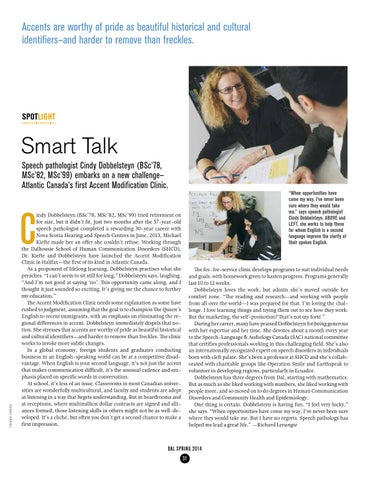Accents are worthy of pride as beautiful historical and cultural identifiers—and harder to remove than freckles.
spotlight
Smart Talk Speech pathologist Cindy Dobbelsteyn (BSc’78, MSc’82, MSc’99) embarks on a new challenge— Atlantic Canada’s first Accent Modification Clinic.
“When opportunities have come my way, I’ve never been sure where they would take me,” says speech pathologist Cindy Dobbelsteyn. ABOVE and LEFT, she works to help those for whom English is a second language improve the clarity of their spoken English.
C
Danny ABRIEL
indy Dobbelsteyn (BSc’78, MSc’82, MSc’99) tried retirement on for size, but it didn’t fit. Just two months after the 57-year-old speech pathologist completed a rewarding 30-year career with Nova Scotia Hearing and Speech Centres in June, 2013, Michael Kiefte made her an offer she couldn’t refuse. Working through the Dalhousie School of Human Communication Disorders (SHCD), Dr. Kiefte and Dobbelsteyn have launched the Accent Modification Clinic in Halifax—the first of its kind in Atlantic Canada. As a proponent of lifelong learning, Dobbelsteyn practises what she preaches. “I can’t seem to sit still for long,” Dobbelsteyn says, laughing. “And I’m not good at saying ‘no’. This opportunity came along, and I thought it just sounded so exciting. It’s giving me the chance to further my education.” The Accent Modification Clinic needs some explanation as some have rushed to judgment, assuming that the goal is to champion The Queen’s English to recent immigrants, with an emphasis on eliminating the regional differences in accent. Dobbelsteyn immediately dispels that notion. She stresses that accents are worthy of pride as beautiful historical and cultural identifiers—and harder to remove than freckles. The clinic works to invoke more subtle changes. In a global economy, foreign students and graduates conducting business in an English-speaking world can be at a competitive disadvantage. When English is your second language, it’s not just the accent that makes communication difficult, it’s the unusual cadence and emphasis placed on specific words in conversation. At school, it’s less of an issue. Classrooms in most Canadian universities are wonderfully multicultural, and faculty and students are adept at listening in a way that begets understanding. But in boardrooms and at receptions, where multimillion dollar contracts are signed and alliances formed, those listening skills in others might not be as well-developed. It’s a cliché, but often you don’t get a second chance to make a first impression.
The fee-for-service clinic develops programs to suit individual needs and goals, with homework given to hasten progress. Programs generally last 10 to 12 weeks. Dobbelsteyn loves the work, but admits she’s moved outside her comfort zone. “The reading and research—and working with people from all over the world—I was prepared for that. I’m loving the challenge. I love learning things and trying them out to see how they work. But the marketing, the self-promotion? That’s not my forté.” During her career, many have praised Dobbelsteyn for being generous with her expertise and her time. She devotes about a month every year to the Speech-Language & Audiology Canada (SAC) national committee that certifies professionals working in this challenging field. She’s also an internationally recognized expert on speech disorders in individuals born with cleft palate. She’s been a professor at SHCD and she’s collaborated with charitable groups like Operation Smile and Earthspeak to volunteer in developing regions, particularly in Ecuador. Dobbelsteyn has three degrees from Dal, starting with mathematics. But as much as she liked working with numbers, she liked working with people more, and so moved on to do degrees in Human Communication Disorders and Community Health and Epidemiology. One thing is certain. Dobbelsteyn is having fun. “I feel very lucky,” she says. “When opportunities have come my way, I’ve never been sure where they would take me. But I have no regrets. Speech pathology has helped me lead a great life.” —Richard Levangie
dal spring 2014 31
